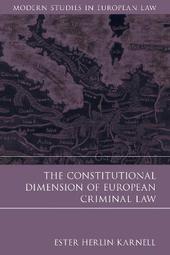
|
The Constitutional Dimension of European Criminal Law
Hardback
Main Details
| Title |
The Constitutional Dimension of European Criminal Law
|
| Authors and Contributors |
By (author) Ester Herlin-Karnell
|
| Series | Modern Studies in European Law |
|---|
| Physical Properties |
| Format:Hardback | | Pages:284 | | Dimensions(mm): Height 234,Width 156 |
|
| ISBN/Barcode |
9781849461764
|
| Classifications | Dewey:345.24 |
|---|
| Audience | | Professional & Vocational | | Tertiary Education (US: College) | |
|---|
|
Publishing Details |
| Publisher |
Bloomsbury Publishing PLC
|
| Imprint |
Hart Publishing
|
| Publication Date |
31 May 2012 |
| Publication Country |
United Kingdom
|
Description
Criminal law is one of the most rapidly changing areas of contemporary EU law and integration. The Treaty of Lisbon has elevated it to a central place in the constitution of the EU, within the dynamic area of freedom, security and justice. The phenomenon of EU criminal law as such is however far from new but has developed on an ad hoc basis, not least as a result of the case law of the European Court of Justice. Central to the Court's reasoning in this area has been the principle of effectiveness. A main theme running through the book is therefore the role of the axiom of effectiveness, which is critically examined, with particular attention to its use by the European Ccurt of Justice in recent leading cases. This book explores the constitutional principles underlying it, both those determining the substantive values it embodies, and those determining its scope and extent. Other chapters consider the phenomenon of preventative criminalisation at EU level and the protection of subsidiarity and proportionality in EU criminal law. The balance between effective EU action, proper control of competence and adequate protection of individual rights is of growing importance as EU criminal law expands, but, as this book suggests, has not yet been fully articulated or entrenched by the institutions of the EU.
Author Biography
Ester Herlin-Karnell is a University Lecturer in EU law at the Free University of Amsterdam (VU) and the Co-Director of the VU Centre for European Legal Studies.
ReviewsThe merits of this work are manifold. The subject matter of the book is original as it offers the first example of examination of EU criminal law institutional aspects. The prose is fluid, rich in metaphors and expressions that catch and keep the reader's attention. The structure of the book, organized into eight chapters, is clearly outlined at the beginning and often recalled and re-explained through several helpful intermediary conclusions. Moreover, the author shows an appreciable mastery of both traditional European law concepts and criminal law axioms. What results is an extremely rich and articulated discussion on their interaction, with an impressive amount of case law and references included. -- Irene Wieczorek * Journal of Common Market Studies, Volume 52, Issue 2 *
|